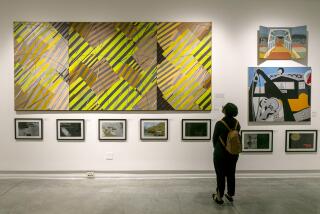CSUN stands by donated artifacts
- Share via
Cal State Northridge stands by the authenticity of eight Chinese artifacts donated to the university, despite doubts expressed by a retired curator and reported in the university’s student newspaper, a CSUN spokesman says.
Meanwhile, a Northridge jewelry manufacturer is suing the donor, his Nevada-based company and others, alleging contractual fraud in connection with the transfer of ownership of other artifacts.
The objects donated to CSUN and those identified in the suit by Zalemark Inc. were part of a larger group of jade, bronze, glass, pottery and other pieces collected by Northern California-based technology entrepreneur Roland Tseng. Tseng gave eight works to the university as part of a $38-million pledge announced in 2003, said CSUN spokesman John Chandler.
Chandler said the university is not involved in the Zalemark suit: “It doesn’t affect our dealings with the donor regarding his donations to the university.”
In court filings, Tseng and others named in the suit denied the allegations. Tseng did not return calls seeking comment, and an attorney representing the Tseng Family Trust and three Tseng family members, named separately in the suit, declined to comment.
The university displayed more than 100 objects from Tseng’s collection in a 2004 exhibition on campus at Oviatt Library. Last month the Daily Sundial, CSUN’s student newspaper, raised questions about the authenticity of some objects in that show.
The Sundial quoted a 2004 letter from George Kuwayama, retired curator of Far Eastern art for the Los Angeles County Museum of Art, to CSUN President Jolene Koester. “Many of the pieces seem misdated with serious questions of authenticity,” Kuwayama wrote.
In the letter, Kuwayama offered his services and those of Pieter Meyers, a former head of conservation at LACMA, and Lothar von Falkenhausen, a UCLA professor of Chinese archeology, to assess the works. Chandler confirmed CSUN declined the offer, saying: “We had the pieces authenticated by a very respected expert in the field, and we stand by that.”
The Sundial, however, raised conflict-of-interest questions about CSUN’s hiring of then-freelance art consultant Frank Preusser to authenticate the artifacts. Preusser had worked for Tseng and was recommended to the university by Tseng. Preusser’s company, Frank Preusser & Associates, is named as a defendant in the Zalemark suit.
Chandler said that Preusser, now a senior conservations scientist at LACMA, “looked at a variety of pieces for us. The ones he supported, the university accepted. The ones he doubted, we did not accept.”
Chandler said the eight accepted objects, which are on display at the library, have an estimated value of $21 million, according to Tseng’s appraisers. They include what is described by CSUN as a 3,000-year-old, $5.5-million gold-and-bronze ritual vessel. Three of the eight objects accepted were part of the 2004 CSUN show; the other five were not, Chandler said.
Kuwayama confirmed that his letter to Koester referred only to pieces displayed in the 2004 exhibition, but he said that after viewing all eight donated objects on the website, his doubts about authenticity remained. “The objects that were given to CSUN are questionable,” he said.
In a lawsuit alleging fraud and filed with Los Angeles Superior Court in April, Zalemark claims that artifacts transferred to it by Tseng’s Nevada-based limited liability company HMFIC were not genuine. The suit, also reported in the Sundial, says the artifacts were transferred in exchange for shares in Zalemark.
The suit also alleges that Frank Preusser & Associates falsely authenticated a Ming Dynasty Chenghua, or Chinese cup.
Reached by phone, Preusser said, “It comes down to the same thing again: ‘He said, she said.’ I haven’t seen anything substantiating the claim that the cup might not be all right, so it’s hard to comment on it.”
In 2003, Tseng pledged to donate to CSUN, over a four-year period, artwork worth up to $38 million. At the time, the pledge was said by CSUN to represent the largest donation ever made to a school in the California State University system.
The remainder of the pledge is now on hold because of “personal issues in Mr. Tseng’s life,” Chandler said.
In response to Tseng’s pledge, CSUN honored the donor and his family with the naming of the Tseng College of Extended Learning and the Tseng wing of Oviatt Library.
More to Read
The biggest entertainment stories
Get our big stories about Hollywood, film, television, music, arts, culture and more right in your inbox as soon as they publish.
You may occasionally receive promotional content from the Los Angeles Times.










